Are you considering to enter the eCommerce industry with your own business? Or, you may have an existing business that you wish to scale.
One of the first ideas that can come to your mind can be a fashion marketplace. And indeed, that is one industry in eCommerce, that has historically gained maximum traction with consumers, making it an easier choice for newer entrants in the industry.
The stats reveal a similar picture – according to Statista, in the year 2022, the fashion eCommerce industry outperformed every other niche, generating US $870 Bn. Significantly, this figure is expected to double itself to US $1.5 T by 2027.
So, how do you begin?
To enter this industry you would need a contemporary fashion eCommerce software. For that purpose, let’s discuss the top 8 marketplace software to build a fashion platform, and how you choose between them.
Table of contents
Why start with a Fashion and apparel eCommerce platform
For an industry that changes with every season, Fashion retail is filled with dynamic energy. With eCommerce, this facet is further accentuated. This results in a fast movement of goods. This means the demand is consistent, (if identified precisely) opening up the scope for revenue generation.
This fast churn is complemented by a low barrier to entry, allowing sellers of this domain easier access. And with an ecosystem that is inclusive of bigger brands and small businesses alike, products that cover both essentials and luxury needs ― the industry caters to a diverse target audience.
Moreover, in the online fashion domain, eCommerce operations like Logistics and warehouse management are easier ― thereby making the delivery and return process simpler.
Furthermore, with globally evolving supply chains, courtesy of B2B fashion marketplaces, the opportunities in this domain are even greater.
All of these factors make Fashion and apparel eCommerce platforms, especially those with multi-seller advantage, a lucrative proposition for aspiring eCommerce entrepreneurs.
Niches in the Fashion eCommerce Industry
Ever since the onset of eCommerce, Apparel and Fashion is one industry that has made online channels imperative and integral. As it is, Apparel is an important part of everyday life for the masses. Online extends this aspect to enhance the value proposition even further. According to McKinsey & Company: online shoppers allocate around 60 percent of their budgets to online purchases.
The positive aspect of this online shift is the opportunities that arise along with it. Let’s discuss the opportunities in Fashion eCommerce
Sustainable Fashion eCommerce platform
If you think about why this is mentioned above everything else: the reason is the rising awareness for sustainable choices. Consumers are getting more and more conscious of the environmental and social impact of the products they purchase. And this has started to include fashion. With sustainability gaining traction as an imperative, a fashion eCommerce platform tailored around this theme can encash on this rising trend, for the present and the future.
Apparel from Emerging Designers
Sellers that have unique products to sell, and don’t want to get lost in the crowd, need a platform that gives them an exclusive ecosystem to ply their trade. Here, upcoming designers are such sellers who need a tailored eCommerce platform. Hence, the scope of launching a fashion marketplace for emerging designers.
Inclusive Fashion marketplaces
Amongst the most trending topics of debate in recent times, inclusivity and diversity also continue to create its own space in the retail ecosystem. There is a growing demand for fashion that caters to diverse body types, skin tones, and cultural backgrounds. For eCommerce businesses this is another opportunity to invest in.
Thrift Marketplaces in Fashion eCommerce
Thrift marketplaces are eCommerce platforms for users to buy and sell used Fashion products. In doing so they extend their value to not just the budget-conscious consumer but those which prioritize sustainable choices as well. Hence, thrift marketplaces are gaining popularity by the day.
B2B Fashion Marketplaces
One of the biggest virtues of online commerce is the bridge it creates between users irrespective of the geographical locations. B2B fashion marketplaces are gaining immensely as eCommerce is able to interconnect supply chains across the globe. For instance, traditional manufacturing powerhouses in Asia are able to serve resellers across countries such as the US and Europe. So, B2B fashion marketplaces are gaining traction as a lucrative option.
Top 5 Players in the Fashion eCommerce Industry
Let’s see which Fashion eCommerce platforms are the top players in this industry.
ASOS
A Fashion and Apparel marketplace based in the United Kingdom, ASOS brings sellers across the globe to consumers in the UK. The marketplace promotes values of diversity, inclusivity, and sustainability. Moreover, it has also received success due to its trend-setting styles.
Amazon
Amazon is the leading player in eCommerce. So it won’t come as a surprise that it is global leader for the fashion and apparel eCommerce niche as well. Amazon leverages its position in the market well, and includes practically everything from anywhere i.e. sellers from across the globe sell under multiple fashion categories, making it a truly global marketplace.
Farfetch
This is another Fashion marketplace from the UK, that is rising to become a leading name in the world of Fashion e-retail. The business model of Farfetch is based on giving its user base access to high-end fashion products and luxury items.
Shein
A China-based global leader in the Fast fashion industry, Shein is another example of tying the efficient manufacturing pedigree of Asia to high consumption markets across the western world ― via an eCommerce marketplace platform. The business model of Shien works by offering each fashion product in small quantities only, adding exclusivity to the product. Hence the term “fast fashion”. This business model has been a huge success, propelling Shein to become a global leader in its niche.
Poshmark
Poshmark leverages the growing trend of thrift fashion eCommerce. It operates on a peer-to-peer business model, offering its users an ecosystem where they can buy and sell used fashion products.
How to Build a Fashion Marketplace
Yes, Fashion eCommerce is a lucrative option for an eCommerce business. There are many established eCommerce marketplace platforms like the ones we discussed. But how do you build your own eCommerce marketplace platform? How do you create a website like ASOS or Amazon?
The easiest way to do so is using fashion eCommerce software. These are turnkey solutions that can be used to launch a fashion e-marketplace with minimum effort.
That said, if you search for an eCommerce software for fashion marketplaces: you will come across multiple choices. Which are the best fit for your purpose? Read ahead to find out.
Below is the list of top top 8 marketplace solutions that can help you in building an eCommerce multivendor platform for the Fashion niche:
- Yo!Kart
- Yo!Kart B2B
- Shopify
- Mirakl
- Sharetribe
- CS-Cart
- Prestashop
- Arcadier
Let’s examine each fashion e-commerce solution in detail and provide you an insights into its software categorization, pros, and cons so that you can select the one that best suits your business needs.
1. Yo!Kart
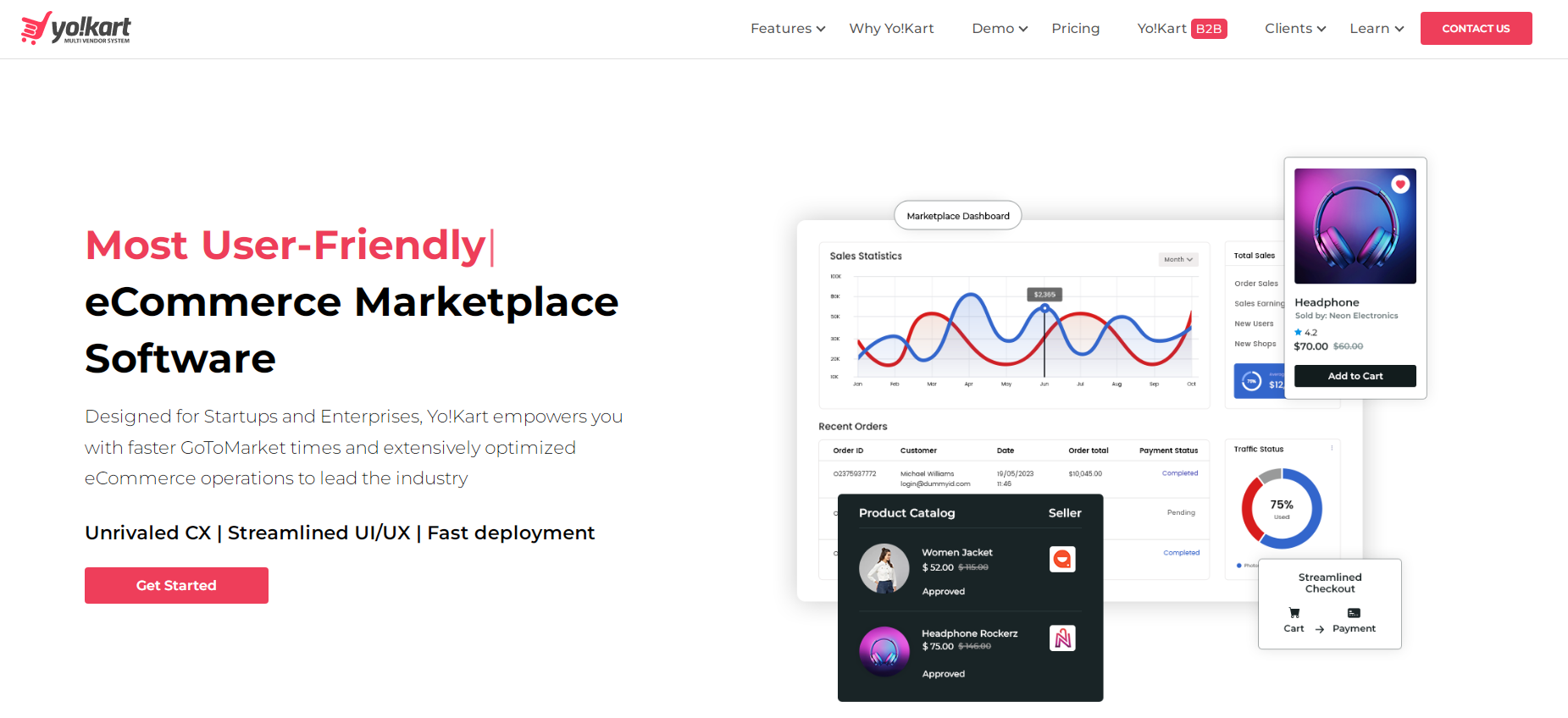 Yo!Kart is a leading multivendor marketplace solution from FATbit Technologies, that has been built from the ground up to power contemporary multi-seller marketplaces.
Yo!Kart has been purpose-built to cover extensive use cases by taking inspiration from the example set by popular marketplaces like Amazon or Etsy and leveraging FATbit’s expertise as a key eCommerce development company. Ergo, 5000+ clients across the globe have found Yo!Kart as an ideal fit for their Fashion marketplace platform.
As a fashion and apparel eCommerce software, Yo!Kart offers key features such as a rich featured CMS for detailed and efficient product listing, support of wide-ranging analytics for data-driven business goals, pivotal marketing features for higher conversions, and more.
Moreover, the solution offers efficiency and high performance – there is support for key business APIs and payment gateways pre-integrated. eCommerce operations are smooth, automated and well-executed, and workflows are logic-driven.
Yo!Kart, further, executes a key eCommerce imperative – customer engagement with good effect. UI is appealing, UX is intuitive and has a logical flow. The overall shopping experience is engaging and fulfilling. These key functionalities make it a top choice for fashion eCommerce software.
Furthermore, Yo!Kart is backed by an in-house team for installation, after-sales, and customization support. The solution is readymade, giving faster go-to-market times
Yo!Kart is available for a lifetime of use with a one-time purchase of a License. There are no hidden charges thereafter. Also included are source-code ownership, up to 1 year of tech support, and others.
Software Classification:
Yo!Kart is a leading multivendor marketplace solution from FATbit Technologies, that has been built from the ground up to power contemporary multi-seller marketplaces.
Yo!Kart has been purpose-built to cover extensive use cases by taking inspiration from the example set by popular marketplaces like Amazon or Etsy and leveraging FATbit’s expertise as a key eCommerce development company. Ergo, 5000+ clients across the globe have found Yo!Kart as an ideal fit for their Fashion marketplace platform.
As a fashion and apparel eCommerce software, Yo!Kart offers key features such as a rich featured CMS for detailed and efficient product listing, support of wide-ranging analytics for data-driven business goals, pivotal marketing features for higher conversions, and more.
Moreover, the solution offers efficiency and high performance – there is support for key business APIs and payment gateways pre-integrated. eCommerce operations are smooth, automated and well-executed, and workflows are logic-driven.
Yo!Kart, further, executes a key eCommerce imperative – customer engagement with good effect. UI is appealing, UX is intuitive and has a logical flow. The overall shopping experience is engaging and fulfilling. These key functionalities make it a top choice for fashion eCommerce software.
Furthermore, Yo!Kart is backed by an in-house team for installation, after-sales, and customization support. The solution is readymade, giving faster go-to-market times
Yo!Kart is available for a lifetime of use with a one-time purchase of a License. There are no hidden charges thereafter. Also included are source-code ownership, up to 1 year of tech support, and others.
Software Classification:
- Multivendor Support: Yes, by default, no external plugins are required.
- Hosting: Self-Hosted
- Open Source: No
- Pricing Model: One-time price packages.
- Target Business Size: Smaller to bigger businesses. (Readymade solution for a quick start/in-house customization for greater business needs)
Pros:
- In-built essential features for Fashion marketplaces.
- Pre-integrated business APIs and popular payment gateways.
- Dedicated user dashboards with streamlined user management for each of the participants – Admin, Seller, Buyer, Affiliates, and Advertisers.
- Support for multiple revenue channels.
- Tested for scalability (*up to 1 million products)
- Highly rated by existing clients.
- Lifetime ownership, no hidden charges.
- Up to 1 year of free Tech support via multiple communication channels.
Cons:
- On a few occasions, there might be a delay in customer support due to time-Zone gaps.
- Post-installation, the learning curve can be higher for new marketplace operators due to a multitude of features.
Get Extensive Features Tailored for Fashion eCommerce
2. Yo!Kart B2B
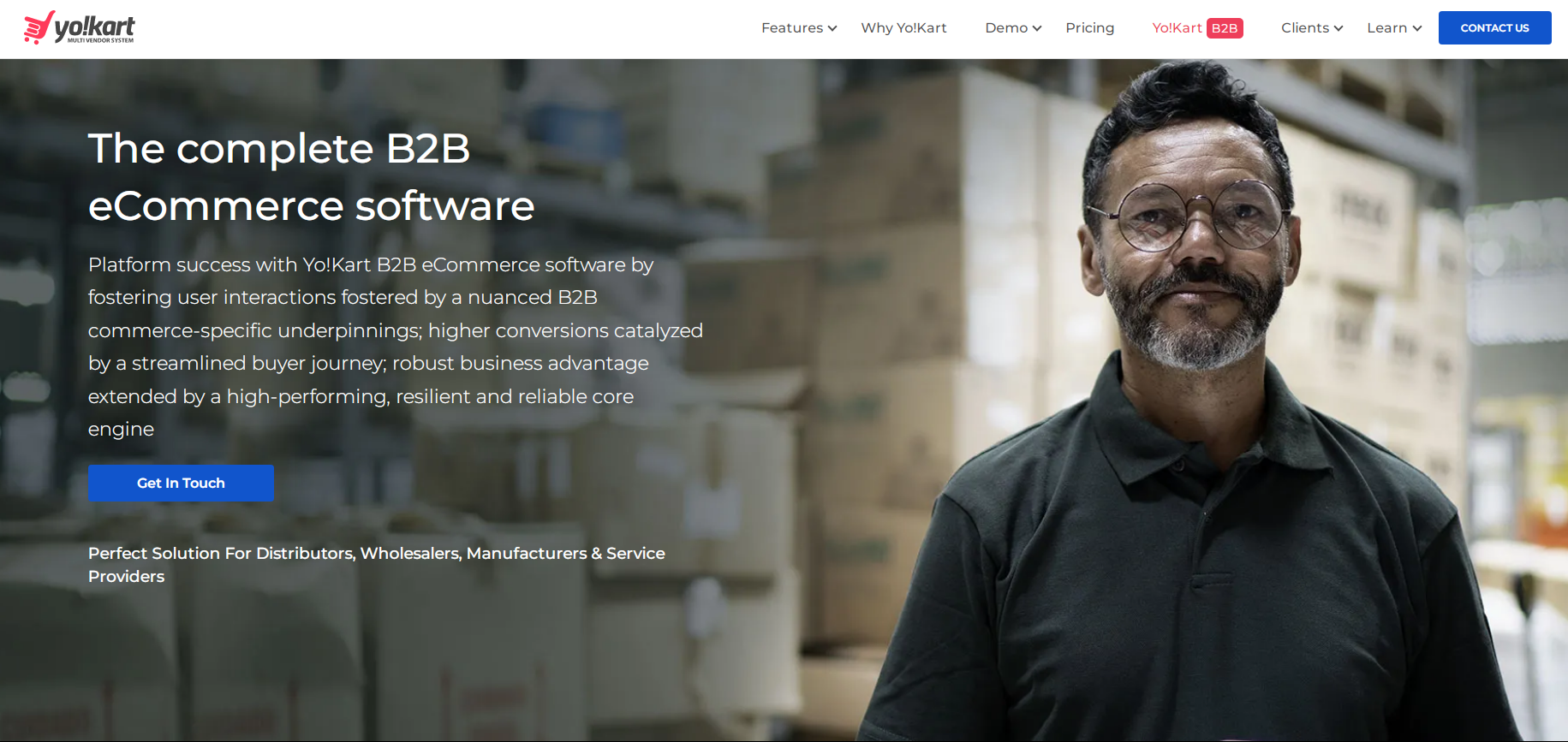 Fashion eCommerce opportunities are not restricted to customer-facing e-marketplaces. There are multiple opportunities to be encashed in the digitalization of Fashion supply chains.
But, B2B eCommerce varies significantly when compared to B2C. B2B requires features to facilitate digital commerce between businesses.
Yo!Kart B2B is a purpose-built marketplace solution for B2B eCommerce marketplaces. It incorporates the signature Yo!Kart experience for all platform participants. Additionally, it offers in-built B2B-specific features for businesses like distributors, retailers, wholesalers, and others.
The software has B2B features like an intuitive RFQ module, bulk order management, the option to offer services with products, direct buyer-seller communication channels, hide prices, custom invoicing, part payments, and more. Moreover, the solution is also offered with multiple business APIs and payment gateways pre-integrated.
Built with robust technologies, the solution offers scalability, security, and reliable performance to suit online transactions in the B2B eCommerce ecosystem.
Yo!Kart B2B is also supported for customizations and after-sales by an in-house team. The solution along with the source code ownership is offered for a lifetime of use in one-time payment price packages starting from $1499.
Software Classification:
Fashion eCommerce opportunities are not restricted to customer-facing e-marketplaces. There are multiple opportunities to be encashed in the digitalization of Fashion supply chains.
But, B2B eCommerce varies significantly when compared to B2C. B2B requires features to facilitate digital commerce between businesses.
Yo!Kart B2B is a purpose-built marketplace solution for B2B eCommerce marketplaces. It incorporates the signature Yo!Kart experience for all platform participants. Additionally, it offers in-built B2B-specific features for businesses like distributors, retailers, wholesalers, and others.
The software has B2B features like an intuitive RFQ module, bulk order management, the option to offer services with products, direct buyer-seller communication channels, hide prices, custom invoicing, part payments, and more. Moreover, the solution is also offered with multiple business APIs and payment gateways pre-integrated.
Built with robust technologies, the solution offers scalability, security, and reliable performance to suit online transactions in the B2B eCommerce ecosystem.
Yo!Kart B2B is also supported for customizations and after-sales by an in-house team. The solution along with the source code ownership is offered for a lifetime of use in one-time payment price packages starting from $1499.
Software Classification:
- Multivendor Support: Yes, by default.
- Hosting: Self-Hosted
- Open Source: No
- Pricing Model: One-time price packages.
- Target Business Size: Scalable, built for manufacturers, distributors, brand retailers, and other B2B businesses.
Pros:
- Signature Yo!Kart experience and all essential inclusions
- Tailormade for Fashion B2B marketplaces.
- Pre-integrated business APIs and popular payment gateways.
- In-built RFQ module.
- Offer bundled services along with products.
- Tested* for scalability (*up to 1 million products)
- Up to 1 year of free Tech support via multiple communication channels.
Cons:
- On a few occasions, there might be a delay in customer support due to time-Zone gaps.
- Post-installation, the learning curve can be higher for new marketplace operators due to a multitude of features.
3. Shopify
 A popular go-to SaaS Fashion and apparel eCommerce software for startups to build online stores – It requires an additional third-party plugin to add multivendor functionality. The solution is robust and dependable. Moreover, It offers simplicity to allow new businesses to start by just signing up on the cloud. Apart from the multivendor plugin, It offers multiple others to add necessary functionalities.
Shopify is offered with a three-tiered subscription pricing model. The features and inclusions will vary depending on the choice. Moreover, the multivendor plugin used will incur further charges. Significantly, with Shopify multiple inclusions are paid, so you will have to calculate the total cost to the business based on your requirements.
Likewise, Shopify offers a good list of features, but not all are available in all packs. Similarly, front-end customisations can be done with themes – some are free, but a good amount of options are available in the paid section.
Software Classification:
A popular go-to SaaS Fashion and apparel eCommerce software for startups to build online stores – It requires an additional third-party plugin to add multivendor functionality. The solution is robust and dependable. Moreover, It offers simplicity to allow new businesses to start by just signing up on the cloud. Apart from the multivendor plugin, It offers multiple others to add necessary functionalities.
Shopify is offered with a three-tiered subscription pricing model. The features and inclusions will vary depending on the choice. Moreover, the multivendor plugin used will incur further charges. Significantly, with Shopify multiple inclusions are paid, so you will have to calculate the total cost to the business based on your requirements.
Likewise, Shopify offers a good list of features, but not all are available in all packs. Similarly, front-end customisations can be done with themes – some are free, but a good amount of options are available in the paid section.
Software Classification:
- Multivendor Support: Third-Party Plugin required
- Hosting: Cloud-Hosted (SaaS)
- Open Source: No
- Pricing Model: Tiered pricing packages with recurring charges.
- Target Business Size: Larger businesses can find overheads challenging for comprehensive needs.
Pros:
- Simple and quick setup with SaaS-based sign-in.
- Plugins are available.
- User-friendly UI.
- Shopify provides reliable customer support through live chat, email, and phone support.
Cons:
- Additional costs for plugins and some features may not be available in all pricing tiers.
- Scalability challenges for larger businesses due to increasing overheads.
4. Mirakl
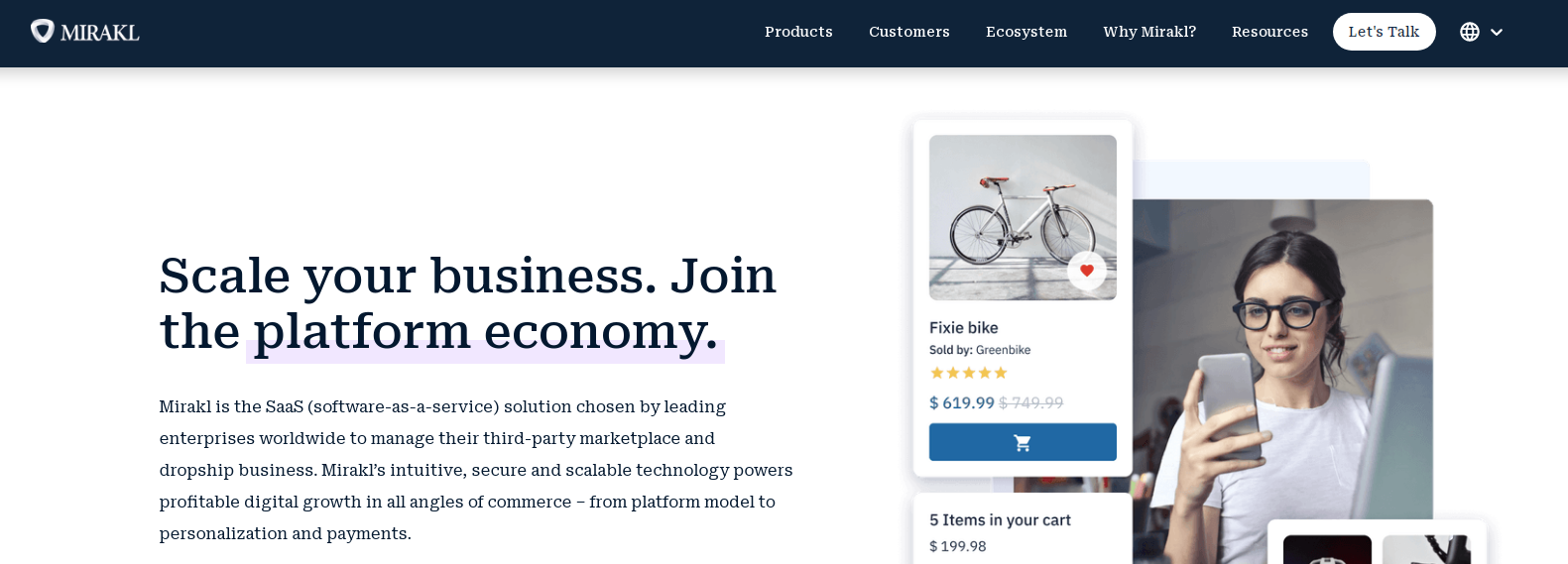 Mirakl is a France-based marketplace solution that has been designed to cater for enterprises’ needs. It offers features for enterprises to integrate their omnichannel commerce with the platform. The solution provider offers features that can cater to multiple business models.
Some key features include easy seller onboarding, which allows the platform operator to gain vendor traction. There is third-party catalog integration which enhances vendor omnichannel capabilities and more.
Mirakl is a SaaS-based solution that offers a good amount of integrations and third-party support to streamline operations for both the marketplace operators and the sellers.
Software Classification:
Mirakl is a France-based marketplace solution that has been designed to cater for enterprises’ needs. It offers features for enterprises to integrate their omnichannel commerce with the platform. The solution provider offers features that can cater to multiple business models.
Some key features include easy seller onboarding, which allows the platform operator to gain vendor traction. There is third-party catalog integration which enhances vendor omnichannel capabilities and more.
Mirakl is a SaaS-based solution that offers a good amount of integrations and third-party support to streamline operations for both the marketplace operators and the sellers.
Software Classification:
- Multivendor Support: By default, no plugins are needed.
- Hosting: Cloud-Hosted (SaaS)
- Open Source: No
- Pricing Model: Not available.
- Target Business Size: Enterprises
Pros:
- Suitable for complex marketplace platform operations/business models.
- Offers omnichannel support for sellers.
- Secure payment processing.
- Pre-Integrated APIs.
Cons:
- Recurring charges and overall cost to build the platform will not suit smaller businesses.
- Not for small marketplaces.
- Overheads can be more.
Start Online Fashion Marketplace with Readymade Solution
5. Sharetribe
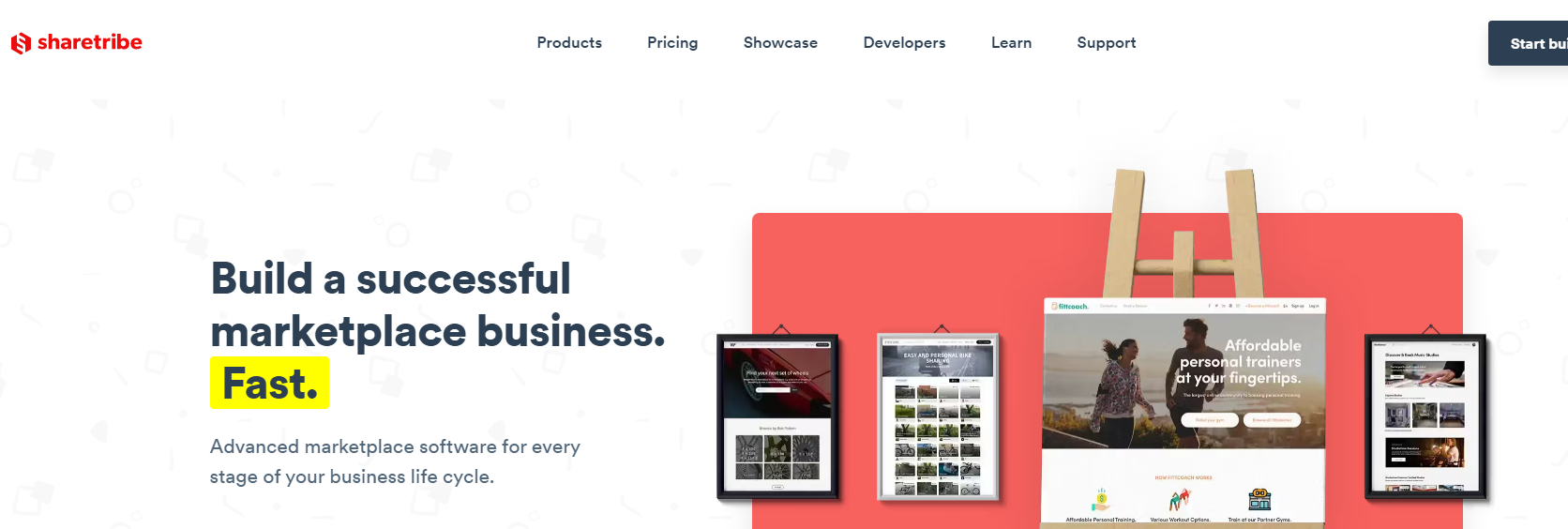
Sharetribe is an eCommerce software that allows entrepreneurs to launch a marketplace like Etsy or other popular eCommerce multi-vendor platforms. It offers two products: Sharetribe Go and Sharetribe Flex.
Sharetribe Go is SaaS-based and you can get started quickly with the fashion marketplace platform. The solution offers customizability to tailor the platform to specific business needs. The marketplace can be tailored for booking, selling, or giving away products for free. It is secure and meets international standards. The scalability is restricted to a certain user base.
On the other hand, as the name suggests, Sharetribe Flex offers more flexibility. The Front-end for this has to be hosted by the marketplace operator. It is a more advanced solution than Sharetribe Go. More customization options allow you to tailor the solution along with API integrations. However, such customizations increase the scope of eCommerce platform projects – both in terms of time and resources. The scalability of Sharetribe Flex is unlimited.
On the features front, Sharetribe offers good features set for marketplace operators to manage their business, such as analytics support, email templates, user verification process, SEO features, social media sharing, and more.
Software Classification:
- Multivendor Support: By default, No plugins needed.
- Hosting: Cloud–Hosted (SaaS – Sharetribe Go)
- Open Source: No
- Pricing Model: Tiered pricing packages with recurring charges.
- Target Business Size: SMBs (Larger businesses can find overheads challenging for comprehensive needs.)
Pros:
- Distinct products in the form of Sharetribe go and Sharetribe Flex.
- Quick setup for Sharetribe Go.
- Customization options of Sharetribe Flex.
- API Integrations – Extended functionality.
Cons:
- Limited Scalability for Sharetribe Go users.
- Customization Complexities.
- Recurring charges add to overheads.
6. CS-Cart
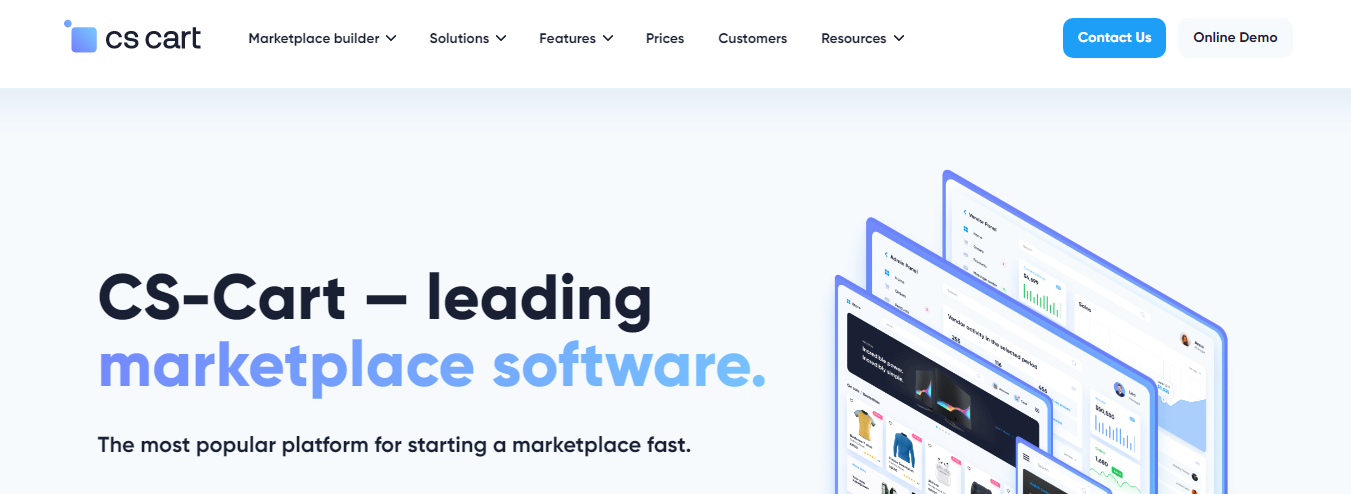 CS-Cart is one of the options as well that can be used to build a multi-vendor marketplace. It used to be offered with a one-time pricing model earlier, but now the prices have increased as the solution now follows a multi-faceted pricing model, attracting recurring charges.
The solution offers a simplistic set of features, making it easy to understand for the marketplace operator and the users. Further paid add-ons can be requested, to get essential eCommerce features on the platform. For instance, Affiliate module, a key feature for fashion eCommerce software, is a paid add-on.
Any customizations needed can be done by partners listed by CS-Cart.
Software Classification:
CS-Cart is one of the options as well that can be used to build a multi-vendor marketplace. It used to be offered with a one-time pricing model earlier, but now the prices have increased as the solution now follows a multi-faceted pricing model, attracting recurring charges.
The solution offers a simplistic set of features, making it easy to understand for the marketplace operator and the users. Further paid add-ons can be requested, to get essential eCommerce features on the platform. For instance, Affiliate module, a key feature for fashion eCommerce software, is a paid add-on.
Any customizations needed can be done by partners listed by CS-Cart.
Software Classification:
- Multivendor Support: Default
- Hosting: Self-hosted
- Open Source: No
- Pricing Model: Tiered pricing packages with recurring charges.
- Target Business Size: SMBs (Larger businesses can find overheads challenging for comprehensive needs.)
Pros:
- Simple interface for users, Intuitive and easy to navigate.
- Multi-Vendor functionality is offered as a default.
- 45-days free technical support.
- Active Community Support
Cons:
- Limited Scalability makes it not suited for large businesses.
- Both Hosted and Self Hosted have Recurring Charges.
- Customization is complex.
- Customer Support / After Sales support is limited and expensive.
Launch Feature Rich Fashion Ecommerce Platform
7. Prestashop
 PrestaShop is an open-source solution that allows building an online store by default. Just like in the case of Shopify, third-party multi-vendor plugins are required for multi-vendor operations.
Key features of Prestashop include capabilities for sellers to manage product listing, intuitive shipping and operations, custom checkout process, and others. It further offers an easy-to-use interface and a robust engine for marketplace owners.
Another key highlight of Prestashop is the compatibility with modules in the PrestaShop repository. Front-end customisation can be done with the help of available themes. Web templates further allow add-on features.
Moreover, the Prestashop system has SEO features to make it easier for marketplace operators to promote their platforms.
While Prestashop basic is available for free download – multiple themes, modules, and more, can be paid. So the final cost of the platform will be subjective and vary according to business needs.
Software Classification:
PrestaShop is an open-source solution that allows building an online store by default. Just like in the case of Shopify, third-party multi-vendor plugins are required for multi-vendor operations.
Key features of Prestashop include capabilities for sellers to manage product listing, intuitive shipping and operations, custom checkout process, and others. It further offers an easy-to-use interface and a robust engine for marketplace owners.
Another key highlight of Prestashop is the compatibility with modules in the PrestaShop repository. Front-end customisation can be done with the help of available themes. Web templates further allow add-on features.
Moreover, the Prestashop system has SEO features to make it easier for marketplace operators to promote their platforms.
While Prestashop basic is available for free download – multiple themes, modules, and more, can be paid. So the final cost of the platform will be subjective and vary according to business needs.
Software Classification:
- Multivendor Support: Third Party Plugin required.
- Hosting: Self-Hosted
- Open Source: Yes
- Pricing Model: Varies according to business needs.
- Target Business Size: Smaller businesses.
Pros:
- Open Source solution.
- Good Ecommerce features set.
- Active community support.
- Flexibility with a modular approach.
Cons:
- Technical Knowledge will be required to set up and operate an open-source solution.
- Picking the right modules and their compatibility with the system.
- Customer Support can be limited.
8. Arcadier
 Arcadier is another SaaS marketplace software to build a multivendor marketplace platform out of the box. It is a flexible software solution that can be customized as per business needs.
For front-end customization, there are themes available, to help personalize the look and feel of the platform. While back end customization is done with the help of the Open-API architecture of the marketplace platform.
The Arcadier platform comes with some good features like catalog management for easy product listing, payment processing for secure payments, order management for sellers and marketplace operators to streamline orders, SEO management, and more.
Arcadier’s Managed Services are offered for clients to identify project requirements and share the business requirements with the company for bespoke solutions.
The incremental approach followed by the Arcadeir, scalability, and open API architecture makes the marketplace solution a good option for enterprises.
Software Classification:
Arcadier is another SaaS marketplace software to build a multivendor marketplace platform out of the box. It is a flexible software solution that can be customized as per business needs.
For front-end customization, there are themes available, to help personalize the look and feel of the platform. While back end customization is done with the help of the Open-API architecture of the marketplace platform.
The Arcadier platform comes with some good features like catalog management for easy product listing, payment processing for secure payments, order management for sellers and marketplace operators to streamline orders, SEO management, and more.
Arcadier’s Managed Services are offered for clients to identify project requirements and share the business requirements with the company for bespoke solutions.
The incremental approach followed by the Arcadeir, scalability, and open API architecture makes the marketplace solution a good option for enterprises.
Software Classification:
- Multivendor Support: By default, No plugins are needed
- Hosting: Hosted (SaaS)
- Open Source: No
- Pricing Model: Tiered pricing packages with recurring charges.
- Target Business Size: Enterprises
Pros:
- Front-end Customization available
- Managed Services model suited to enterprises.
- Multi-Lingual Support
- Open-API Architecture for backend support.
Cons:
- Recurring charges.
- Smaller businesses may find extensive customization challenging due to their limited technical knowledge and resources available.
To Conclude
Fashion eCommerce is a low barrier to entry, a thriving industry that offers lucrative opportunities for both customer-facing (B2C) and B2B marketplace platforms. Moreover, the scope of the business can vary with equal opportunities for smaller and larger marketplaces.
But given these factors, newer entrants will also have to navigate existing and new competition. Hence the need for a carefully laid out business plan.
And, to execute this business plan, you will need the right set of tools, purpose-built for success, in your Fashion eCommerce software.
Quintessential features for fashion platforms, an easy start, affordability, reliability, and predictability are catalysts that give you an advantage right from the start – propelling your growth engine by allowing you to implement short-term and long-term goals.
FAQs
- How can I start a fashion marketplace?
Ans: The easiest way to start a fashion marketplace is to use a turnkey solution. To do that, first find a Fashion and Apparel eCommerce software that best suits your business goals.
- What is a SaaS Fashion eCommerce software?
Ans: SaaS means Software as a service. Basically meaning that the software is owned by the software company and offered as a service, rather than the product itself. These solutions are hosted over the cloud by the company offering the service. Consumers use this service till the time they wish to, and typically pay rent till the time they do so. Once they no longer require the services, they can stop paying the rent and accordingly the services will be withdrawn by the services provider, which includes the product itself.
- What is self-hosted Fashion eCommerce software?
Ans: These are solutions that can be hosted by the entrepreneur/business owners themselves. This means that unlike SaaS-based fashion eCommerce software, here the product itself is part of the cost you pay.
- Which is the most affordable eCommerce platform?
Ans: Typical costs of an eCommerce software to an online business include:
- Cost of solution (Fixed one-time/ recurring rent)
- Cost of features and their functionalities.
- Need for additional modules or plugins
- Customization (if needed)
- Backend API integration
- Deployment
- Technical support
Here, YoKart developed by FATbit Technologies, comes with a fixed one-time cost for its License (includes Source Code ownership for a lifetime of use). The solution is packed with eCommerce essential features. Each of these is complete with intuitive functionalities. Moreover, there is up to 1 year of technical support. Installation is free. Any customization needed is offered in-house.
All these virtues make YoKart a high value eCommerce software, and one of the most affordable yet feature-packed options in the industry.





 Sharetribe is an eCommerce software that allows entrepreneurs to launch a marketplace like Etsy or other popular eCommerce multi-vendor platforms. It offers two products: Sharetribe Go and Sharetribe Flex.
Sharetribe is an eCommerce software that allows entrepreneurs to launch a marketplace like Etsy or other popular eCommerce multi-vendor platforms. It offers two products: Sharetribe Go and Sharetribe Flex.



